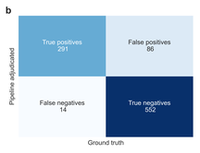
Open-source computational pipeline flags instances of acute respiratory distress syndrome in mechanically ventilated adult patients
Abstract
Physicians in critical care settings face information overload and decision fatigue, contributing to under-recognition of acute respiratory distress syndrome, which affects over 10% of intensive care patients and carries over 40% mortality rate. We present a reproducible computational pipeline to automatically identify this condition retrospectively in mechanically ventilated adults. This computational pipeline operationalizes the Berlin Definition by detecting bilateral infiltrates from radiology reports and a pneumonia diagnosis from attending physician notes, using interpretable classifiers trained on labeled data. Here we show that our integrated pipeline achieves high performance—93.5% sensitivity and 17.4% false positive rate—when applied to a held-out and publicly-available dataset from an external hospital. This substantially exceeds the 22.6% documentation rate observed in the same cohort. These results demonstrate that our automated adjudication pipeline can accurately identify an under-diagnosed condition in critical care and may support timely recognition and intervention through integration with electronic health records.